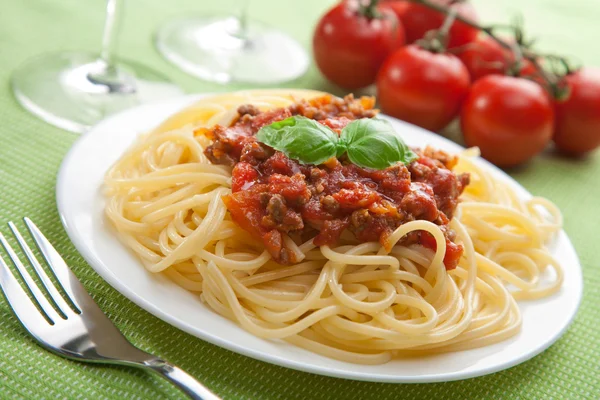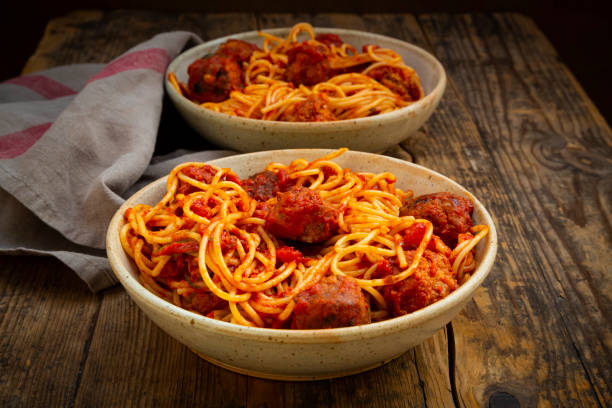Spaghetti comes in many shapes and sizes. It is usually made from wheat flour mixed with water and then rolled into long thin strings. Spaghetti is one of the oldest types of pasta, originally from southern Italy.
Spaghetti can be served with tomato sauce, meatballs, or other toppings but can also be eaten in various ways. One popular way to eat spaghetti is with a carbonara sauce, tomato stew, or olive oil and parmesan cheese.
Many types of spaghetti are refined during processing by stripping the wheat kernel of the bran and germ and reducing a lot of the nutrients.
Some refined spaghetti are usually enriched with nutrients, such as B vitamins and iron. However, refined spaghetti has higher calories and is lower in fiber.
Nonetheless, the healthiest type of spaghetti to eat is whole-grain spaghetti. Whole-grain spaghetti contains all parts of the wheat kernel and has more fiber.
Spaghetti is a staple in many households, but did you know it has some health benefits?
Spaghetti is a great source of carbohydrates, protein, and fiber. It’s also an excellent source of vitamin B-12, iron, and selenium.
This article discusses some potential health benefits of spaghetti. Please note that what makes spaghetti healthier are the toppings, such as meat, sauce, cheese, vegetables, and herbs.
7 Health Benefits of Spaghetti

Here are some other health benefits of spaghetti:
1. Might help fight cancer
A study published by the American Institute for Cancer Research stated eating spaghetti might help prevent cancer.
The researchers believe this is because the fiber in spaghetti slows down digestion, which may reduce levels of carcinogens entering the colon.
Also, spaghetti with tomato sauce also contains lycopene, an antioxidant that helps fight cancer cells in your body. The lycopene in spaghetti has been linked to a reduced risk of cancer, including prostate, ovarian, breast, and cervical cancer.
2. May help to manage diabetes
A study found that people with type 2 diabetes who ate pasta at least four times per week had lower blood glucose levels than those who ate pasta less often or not at all.
Eating more whole grains like whole-grain spaghetti may help keep blood sugar under control because they have a low glycemic index (GI), which means they raise blood sugar slowly over time rather than causing spikes in your blood sugar right away after eating them.
3. Aids digestion
Eating spaghetti helps keep your digestive system running smoothly because it contains insoluble and soluble fiber.
Fiber helps move food through your digestive tract more quickly so that waste can be eliminated from the body more efficiently. That means less constipation and diarrhea!
4. Rich in selenium
Both refined, enriched, or whole-grain spaghetti are all rich in selenium. In fact, one cup of spaghetti contains 40 to 50 mg of selenium, which is about 55% of the RDI.
Selenium is a vital trace mineral that plays a role in many bodily processes. It can help improve cognition, immune system function, DNA production, and fertility.
5. Gives energy
Spaghetti is high in carbohydrates and contains few calories, which means it’s an ideal food for boosting energy levels.
A serving of spaghetti contains 37 grams of carbohydrates. These carbohydrates provide your body with energy.
6. Nutritious food
Spaghetti contains many essential nutrients for good health, including protein, iron, and vitamin B1 (thiamine). Eating spaghetti regularly can contribute to maintaining good health when combined with other healthy foods such as fruits and vegetables!
7. May help with weight loss
Spaghetti is an excellent substitute for rice and potatoes, which are high in carbs. It is also rich in fiber, which boosts digestion and prevents constipation.
Spaghetti is moderate in calories and fat and has zero cholesterol content. Also, it fills your stomach fast and curbs your desire for more food, which makes you eat less.
In fact, one study found that whole-grain pasta reduces appetite and increased fullness.
However, it must be eaten with portion control and along with other healthy ingredients.
Conclusion
The health benefits of spaghetti can be reduced if spaghetti is eaten with an unhealthy combo. You should eat spaghetti with a healthy diet, such as a well-prepared tomato stew, with olive oil and some garlic and ginger spices, or other healthy ingredients.
Avoid eating spaghetti with processed meat or fish; use fresh fish and meat instead.
ALSO READ:
- 9 Powerful Health Benefits Of Raw Garlic
- 9 Perfect Health Benefits of Pure Cocoa Powder
- 7 Magnificent Health Benefits of Oats
- 7 Perfect Health Benefits Of Parfait
- 10 Amazing Health Benefits Of Bay Leaves
- 9 Delightful Health Benefits of Sugarcane Juice
- 10 Grand Health Benefits of Tangerine Peel
- 8 Health Benefits of Scotch Bonnet Pepper (Ata Rodo)



